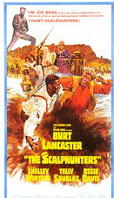
Directed by
Sydney Pollack
104 minutes
Rated M
Reviewed by
Bernard Hemingway

The Scalphunters
The sub-genre of the comedy Western is an unusual one, ranging from the outright comedic as in The Ballad Of Cable Hogue (1970) to the musical spoof as in Cat Ballou (1965) to this film with its tongue-in-cheek reworking of the form of the traditional Western as a satirical vehicle.
Thus Pollack's movie (released the year before Peckinpah's 1969 benchmark, The Wild Bunch) has at its core the see-sawing relationship between a white trapper (Burt Lancaster) and an escaped slave (Ossie Davis). It is an approach which runs the risk of pleasing no-one, the traditionalists being undercut by the irreverent humour, the socially critical being frustrated by the same irreverence.
William Norton's screenplay explores the contradictions inherent in the situation of an educated, pampered slave, his head full of fine-sounding ideas and the tough, untutored trapper, brought up in the harsh realities of the everyday. Despite the film's title he is far less concerned with the lot of the Native American Indians who remain stereotypical figures. Either way the film partakes decidedly of the naivite of the earlier '60s.
Burt Lancaster is a dab hand at the kind of understated playfulness required for his role and Ossie Davis makes a fine sparring partner for him. Shelley Winters dutifully provides the broad humour, whilst Telly Savalas is Telly Savalas and the proceedings are aided and abetted by Elmer Berstein's jaunty score.
Want something different?





